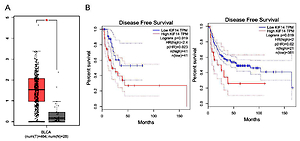Current issue
Archive
Manuscripts accepted
About the Journal
Editorial office
Editorial board
Abstracting and indexing
Subscription
Contact
Ethical standards and procedures
Most read articles
Instructions for authors
Article Processing Charge (APC)
Regulations of paying article processing charge (APC)
UROLOGY / EXPERIMENTAL RESEARCH
Kinesin family member 14 induces tumor cell proliferation in muscle invasive bladder cancer
1
Department of Urology, Lianyungang TCM Hospital Affiliated to Nanjing University of Chinese Medicine, Lianyungang, Jiangsu Province, China
Submission date: 2020-01-29
Final revision date: 2020-04-20
Acceptance date: 2020-04-22
Online publication date: 2021-04-10
Corresponding author
KEYWORDS
muscle invasive bladder cancer (MIBC)kinesin family member 14 (KIF14)proliferationclinical featurestherapeutic target
TOPICS
ABSTRACT
Introduction:
Bladder cancer ranks first in the morbidity of urogenital malignancies in China. Bladder cancers are pathologically classified into 2 subtypes: non-muscle invasion bladder cancer (NMIBC) and muscle invasive bladder cancer (MIBC). MIBC is a highly lethal tumor and targeted therapies are a promising prospect for the treatment of MIBC. Novel therapeutic targets are still badly needed to combat this disease. Kinesin family member 14 (KIF14) is an engaging molecular motor and is involved in multiple cellular processes such as cell division. Additionally, KIF14 is highly expressed in multiple tumor tissues and participates in the progression of several cancers such as gastric cancer and hepatocellular carcinoma. However, its possible role in the development of bladder cancer remains unclear.
Material and methods:
Herein, 107 cases of MIBC tissue specimens were collected and detected by immunohistochemistry assays, and we analyzed the relationship between AKIF14 expression and clinical features.
Results:
We detected high expression of KIF14 in tumor tissues from patients who underwent MIBC. Furthermore, KIF14 was significantly correlated with clinical features, such as tumor stage (p = 0.001). Then we used the cell line T24 and 5637 of bladder cancer in the experimental group transfected with the shKIF14 plasmid. Our results further confirmed the impairment of proliferation capacity after KIF14 ablation in vitro. KIF14, additionally, promoted tumor growth of MIBC in mice.
Conclusions:
We surmised that KIF14 could serve as a promising therapeutic target for the treatment of MIBC.
Bladder cancer ranks first in the morbidity of urogenital malignancies in China. Bladder cancers are pathologically classified into 2 subtypes: non-muscle invasion bladder cancer (NMIBC) and muscle invasive bladder cancer (MIBC). MIBC is a highly lethal tumor and targeted therapies are a promising prospect for the treatment of MIBC. Novel therapeutic targets are still badly needed to combat this disease. Kinesin family member 14 (KIF14) is an engaging molecular motor and is involved in multiple cellular processes such as cell division. Additionally, KIF14 is highly expressed in multiple tumor tissues and participates in the progression of several cancers such as gastric cancer and hepatocellular carcinoma. However, its possible role in the development of bladder cancer remains unclear.
Material and methods:
Herein, 107 cases of MIBC tissue specimens were collected and detected by immunohistochemistry assays, and we analyzed the relationship between AKIF14 expression and clinical features.
Results:
We detected high expression of KIF14 in tumor tissues from patients who underwent MIBC. Furthermore, KIF14 was significantly correlated with clinical features, such as tumor stage (p = 0.001). Then we used the cell line T24 and 5637 of bladder cancer in the experimental group transfected with the shKIF14 plasmid. Our results further confirmed the impairment of proliferation capacity after KIF14 ablation in vitro. KIF14, additionally, promoted tumor growth of MIBC in mice.
Conclusions:
We surmised that KIF14 could serve as a promising therapeutic target for the treatment of MIBC.
Share
RELATED ARTICLE
We process personal data collected when visiting the website. The function of obtaining information about users and their behavior is carried out by voluntarily entered information in forms and saving cookies in end devices. Data, including cookies, are used to provide services, improve the user experience and to analyze the traffic in accordance with the Privacy policy. Data are also collected and processed by Google Analytics tool (more).
You can change cookies settings in your browser. Restricted use of cookies in the browser configuration may affect some functionalities of the website.
You can change cookies settings in your browser. Restricted use of cookies in the browser configuration may affect some functionalities of the website.



